For many Corvette owners, the company never supplies enough horsepower. One of the reasons we have a mid-engine Corvette after all these years is that the engineers felt that adding horsepower would no longer make the car much faster. No way to efficiently put that power to the ground. In 1990, Chevrolet, with the help of Lotus, found a way to give the C4 a lot more horsepower. That still wasn’t enough for hot rod mad genius John Lingenfelter. Take a look at this 1993 Chevrolet Corvette ZR-1 for sale on eBay in Saint Joseph, Minnesota. This car is equipped with a Lingenfelter 32-valve engine packing 402 cubic inches and 600 horsepower. Right now, bidding is sitting at $25,100 with just 24 hours to go. Is this collectible cruise missile a performance bargain at that price?
For those of you who weren’t around for the debut of the fourth-generation Corvette, you missed something special. America was a different place then, and patriotism was at an all-time high. America’s sports car was the Corvette. Sadly, Chevrolet had let the Corvette devolve into a boulevard cruiser. The automotive press constantly rubbed in America’s face the Corvette’s inferiority to the offerings across the pond. Especially annoying was the constant worship of all things Porsche by the motoring press. The old C-3, with a chassis that dated back to 1963 was no match for Europe’s best. We knew that because the magazines prattled on endlessly about the magic that radiated from anything from across the pond. Even the Japanese played second fiddle.
Despite all of this, news about Corvettes sold a lot of magazines. We all waited with hopeful anticipation as information trickled out, often accompanied with wild drawings of what they speculated the all-new Corvette would look like. The lack of 1983 Corvettes only threw gas on the fire. When the car finally appeared, it was like it was from another planet. Finally, we had a Corvette that would show the snooty Europeans its four distinctive taillights. The magazines were full of comparison stories pitting the Corvette against everything from full exotics to Porsche’s then-new 944 (really a warmed-over 924, but to them, it was manna from heaven). While damning it with the usual criticisms concerning the amount of plastic and the build quality, they had to agree that the new Corvette was a major leap forward for American sports cars. America finally produced a worthy competitor.
All those Corvette stories were real moneymakers for the magazines. The problem was that change was incremental and slow for the Corvette. Every year the horsepower got bumped up a little or a small change was made in styling. Stories were written, but the public wanted more. Nobody wants to read a comparison test between a Dodge Shadow and a Honda Civic. Readers wanted red meat and a lot of it. About this time Reeves Calloway and John Lingenfelter entered the picture. These two speed demons and the companies behind them began to modify Corvettes to the point that they could whip any supercar the magazines threw at them and still be docile enough to drive to the corner for milk and a loaf of bread.
In 1990, Chevrolet surprised everyone by dropping the ZR-1 Corvette on the marketplace. Packing a 32-valve Chevy V-8, a six-speed transmission, wider tires, and a rear-end restyle, this Corvette was an expensive way to deal with any Porsches in your neighborhood. John Lingenfelter saw an opportunity to take the Corvette that the magazines dubbed “King of the Hill” and make it significantly faster using several tricks ranging from lightening the drivetrain to adding cubic inches. A Lingenfelter Corvette with a claimed 450 horsepower engine was clocked at 191 MPH in one test. This was deep into supercar territory in the early nineties. The magazines loved writing up these beasts in months when Corvette news from GM was slim, and America’s gearheads bought the magazines hand over fist. It was a great time to be a Corvette lover.
The modified ZR-1 you see here is a 1993 model with a claimed 402 cubic inches and 600 horsepower. The car has also received numerous modifications, such as upgraded brakes, wheels, and headers, and just about everything that would make it go faster or stop quicker was breathed upon. While the explanation is not clear as to why the car has two ZR-1 engines (one in the car and one on a stand), the original engine is included in the sale minus the crankshaft, cams, pistons, and connecting rods. They are currently living in the engine that powers the car. In the ad, the mileage is listed as being 87,880. There is no mention as to when the engine change occurred.
As far as the condition goes, this car looks to be almost showroom new. This is especially remarkable considering the mileage. The big clue for C4 Corvettes and how well they have been taken care of is the seat bolsters. Getting into a C4 is a struggle unless you are a contortionist or a skydiver. Normal people have to sit on the door sill, insert legs and try to gracefully lift over the bolster and slide right in. As you would expect, the outside seat bolster gets a workover. In this car, the red bolster looks very good. Maybe that was highway mileage. Everything else points to this ZR-1 being someone’s prized garage queen.
If the horsepower claim is true, then this is a car that can break the 200 MPH mark on demand and get there in a hurry. A car like this would likely sell at a higher price had the story been fleshed out better. Regardless, those who remember when these cars graced the pages of popular car magazines know that this ZR-1 is something special. Many of us had posters of such cars on our bedroom walls. For the price of a new Civic, the adult you could put this one in your garage.
Do you remember the Corvette stories in the car magazines of the eighties and nineties? What were some of your fondest memories of the Corvette at that time? Please share your thoughts in the comments.
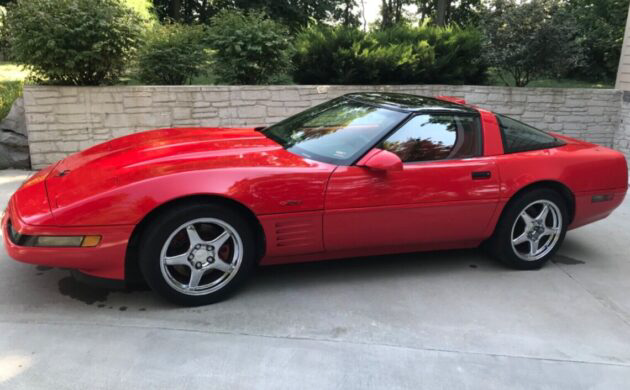
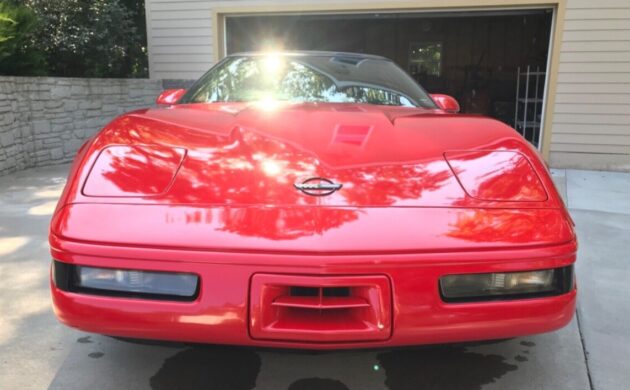
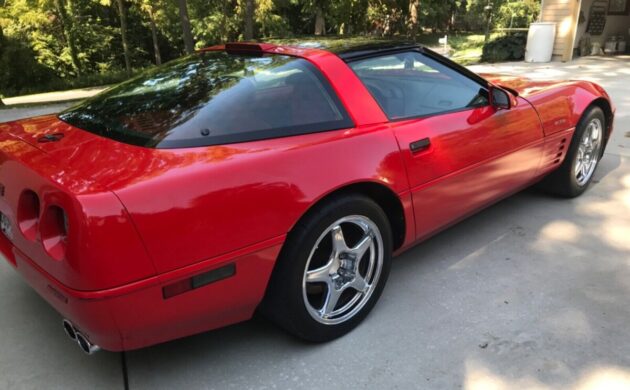
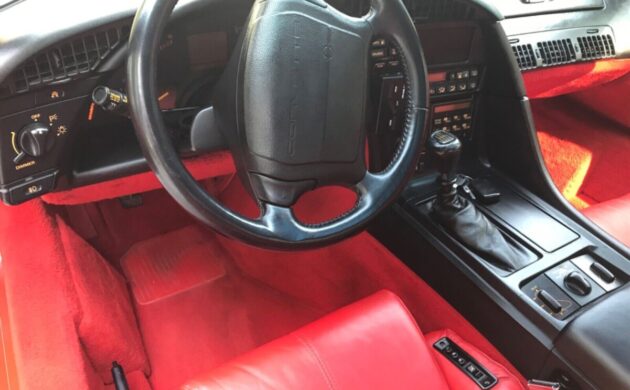
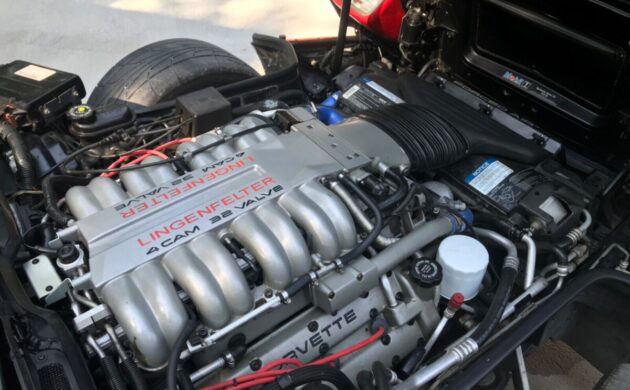
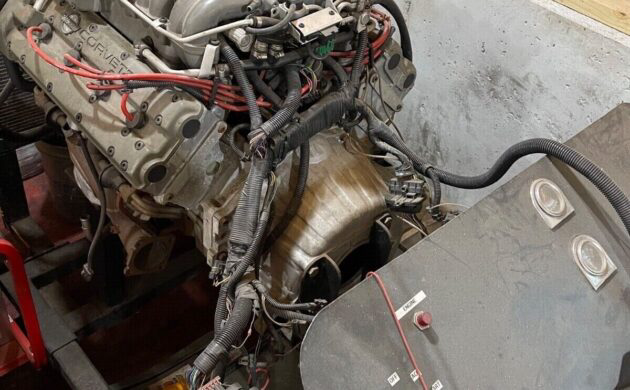



I had a 1986 C4 with the 5.7 liter V8 that was modifed primarily for a street legal autocross class. Working with former Pontiac engineer, Herb Adams, my car with street-legal tires in 1986 pulled 1.03G on a skid pad. While these cars lack the structural stiffness of the C5 and later cars, the rear geometry is (my opinion) better for traction off the line or exiting a corner than the later cars. And with simple replacement of suspension bushings to sperical bearings in the rear, and Delrin/steel sleeves in the front are easy to drive fast, and highly predictable at the limit, and still streetable. They are also significantly lighter than the C7.
The ZR1 engine was a Lotus design, built by Mercury Marine. Chevrolet did bolt it in though…
You make it sound like that happened by random chance, and GM didn’t give the go ahead and sign the checks to make this supercar possible.
You make it sound like GM didn’t farm the motor out in both design and manufacture. GM did stipulate the motor was to be the same bore spacing as the small block inches even though Lotus argued that would limit horsepower. I’m adding in out what the article left out, give credit where credit is due.
I’m surprised the bidding is as robust as it is. At the end of the day, this is basically a modified ZR1 C4 with high mileage, albeit with Lingenfeltee provenance. You could get a stock one with under 10,000 miles for this price
I too am a little confused about the engine situation.Why would you pull the internals out of the old one? Why not just rebuild the old one? That’s a little strange, as it seems like a key part of the value of this lies in it having the original Lingenfelter modified engine.
I would assume because the block was wounded and the new block was machined to accept the high-zoot internals. Whether it becomes a spare or a display piece is yet to be determined.
But the top end of these is what’s special — and valuable — about these anyway … so there’s hope.
Thanks jrhmobile, I suppose that makes sense. But if something wounded the block, I’d be very concerned about the condition of the internals too. Maybe its nothing. Anyway, GLWS! An incredible amount of money for a C4 regardless.
To get to 402/600+would require BIG Bore and Big Stroke with Bigger Cams…..I’m sure John could do it, but that one-off engine had be very expensive for its day……
That was what John did. Punched the LT5 out to 451 ci.
He also built four with twin turbos. Here’s video of him testing one…it eventually ran the quarter in 9.52 @ 153 mph at Beech Bend. Flat out wicked.
Edit: 415 ci. And here is the video.
https://www.youtube.com/watch?v=IPZk7T09fbE
John Lingenfelter was a genius when it came to getting the most out of a street engine. I don’t know why it took the OEM’S so long to figure out that four valves per cylinder is optimum for torque AND horsepower with good fuel economy as a side benefit.
I remember most the staggering top end on these machines, and imagined how fast things must be moving by at 190+mph wow. Must be alot of fun on the racetrack 🏁
@jrhmobile is right. GM had deep involvement, and my understanding is that this was part of a bolder proposal to incorporate Lotus’ active suspension into the Corvette. That part didn’t make it into production but I know the GM engineer that worked on that engineering development project. GM actually DID use the Lotus Active suspension in the IMSA Corvette GTP car.
SOLD: $28,200
Someone got a helluva car
Very strong car for 28k agree 👍
Reserve not met, so no sale at 28k
Edit for my other reply: 415 ci. Finger slipped.
I own the car it really runs. Expensive engine package. At 30k back in 1998. 609hp at 7200 rpm. I Have Dyno sheets from LPE. The engine on the stand is the original matching numbers 405 hp engine that was installed at the factory.